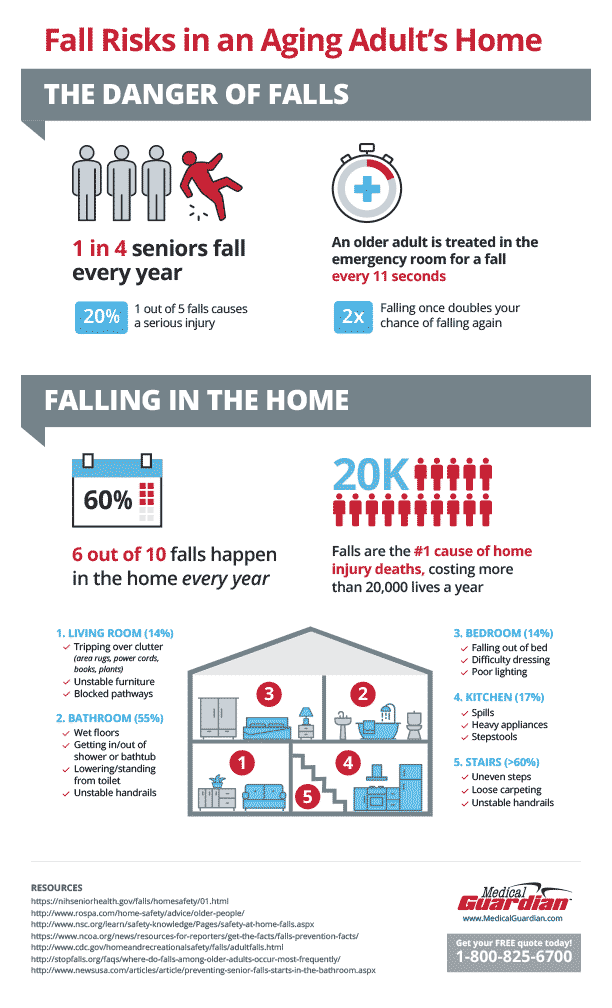Caring For Your Aging Loved Ones: Top 10 Home Safety Tips
When you purchase through links on our site, we may earn a commission. Here’s how it works.
This guest post was written by Paige Coho, the Marketing Manager at Medical Guardian. Read her list of safety tips to consider when caring for aging family members.

Between mobility limitations, chronic conditions, and even the risk of elderly falls, ensuring a loved one’s safety in the home can become much more difficult. Although many obstacles threaten a senior’s ability to age in place, these tips for caring for the elderly at home will help keep your loved one both healthy and safe for many years to come.
5 Tips On How To Care For Aging Parents
While it’s true that aging brings with it many challenges and changes, that doesn’t mean that your loved one’s quality of life has to diminish. In fact, there are many ways that you can help them maintain their quality of life as they age with these senior care tips.
1. Encourage Them to Exercise Daily
Exercise is the best way to combat mobility limitations, which is the most common disability among seniors. Not only will regular exercise improve their mobility and balance, but it will also lower your loved one’s risk of heart disease, diabetes, and other chronic conditions. For your loved one to reap the most benefits, make sure their fitness routine is well-rounded, meaning that it includes a variety of aerobic, balance, and strength-training exercises.
2. Keep Their Mind Sharp
Although it’s often overlooked, staying mentally active is just as important as physical activity. Luckily, there are plenty of brain-stimulating activities you and your loved one can enjoy together, like puzzles, reading, arts and crafts, and even learning a new language.
3. Prepare Nutritious Meals Together
Many seniors feel less comfortable cooking meals for themselves as they age, leading many to rely on processed foods. Although convenient, these foods are high in sodium, fats, and sugars – all of which damage a senior’s health. To ensure your loved one is getting the necessary nutrients, create a meal plan for them filled with fresh fruits, vegetables, fish, and other healthy foods, and assist them in cooking the meals.
4. Promote Socialization
If your loved one hasn’t left their home in a while or if they haven’t talked to friends recently, this can have detrimental effects on their health. Lonely seniors are much more likely to be affected by dementia and depression. Should you notice any signs of isolation, encourage them to reconnect with friends and maybe even make new ones. Look for programs at nearby community centers, or help them organize a weekly meal with friends at a nearby restaurant.
5. Review Their Medications
While medications are key in controlling chronic conditions, mismanaging these prescriptions is dangerous and results in millions of hospitalizations a year. If your loved one has difficulty remembering when they need to take each prescription, a medication management service or a simple pill organizing box will go a long way in ensuring their health at home.
5 Things You Can Do Now To Prevent Falls
Now that you know how to ensure your loved one’s health as they age in place, the next step is reducing your loved one’s risk of falling. Although, according to NIH, 6 out of 10 elderly falls occur within the home, the good news is that most falls are preventable thanks to these simple and affordable home modifications.
1. Remove Clutter
Since most elderly falls occur from tripping over something, clear all floors, hallways, and staircases of any clutter. Common tripping hazards include electrical cords, area rugs, loose carpeting, books, magazines, newspapers, shoes, plants, and blankets.
2. Add Lighting
Poor lighting is one of the biggest contributors to elderly falls, especially if your loved one suffers from any vision problems. Add more lamps and nightlights to each room and hallway, and remind your loved one to open the curtains during the day. You should also make sure that the path from your loved one’s bedroom to the bathroom is clearly lit.
3. Prevent Falls In The Bathroom
For any senior living alone, the bathroom poses the biggest threat to their safety, as more than 230,000 accidents occur in the bathroom every year, according to the CDC. The most common accident, known as “The Bathtub Fall,” occurs when a senior slips while trying to get in or out of the shower or bathtub. To completely eliminate this safety hazard, invest in a walk-in shower or a transfer bench. To give your loved one even more support, install grab bars, non-slip mats, and raised toilet seats.
4. Promote Safety On The Stairs
The CDC also states that more than 60 percent of senior deaths are caused by accidents on stairs, make sure that each staircase has sturdy handrails and non-slip treads on every step. If the steps are carpeted, make sure the carpet is firmly attached. If your loved one suffers from limited mobility, investing in a stair lift may be the best option to keep your loved one safe on the stairs.
5. Ensure Their Safety, 24/7
When it comes to promoting safer senior living in the home, nothing is better than having a medical alert device on their side. Whether your loved one experiences a fall, medical emergency, power outage, home intrusion, or house fire, they have guaranteed access to help 24/7. Plus, you can rest assured that Medical Guardian’s top-rated monitoring center will notify you immediately of the emergency and give you real-time updates about your loved one’s condition.
Risks Of Falling Infographic
This infographic provides some additional stats on the risks of falling in aging adults.

Video: Fire Prevention Tips For Seniors
Here are some additional tips from The National Fire Prevention Association on how to prevent fires in the homes of the elderly (who are more likely to cause accidental fires as they get older).
By following these senior care tips, not only will your loved one be able to continue living independently, but you’ll enjoy the peace of mind that comes with knowing that they are safe in their home, even if you can’t always be there with them.
Thanks Paige and Medical Guardian for sharing these tips!
More On Medical Guardian
Do you want to learn more about Medical Guardian? You can visit their website, read our in-depth Medical Guardian Review or see how they stack up in our medical alert system comparison.



